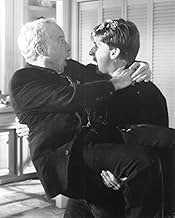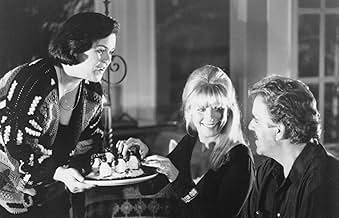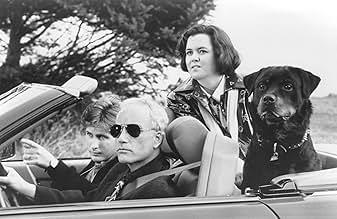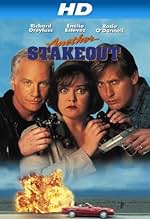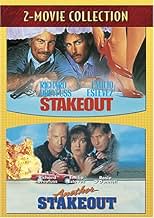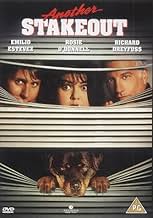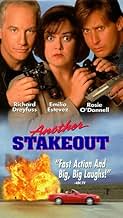IMDb RATING
5.6/10
16K
YOUR RATING
Immature detectives Chris Lecce and Bill Reimers are joined by pesky assistant district attorney Gina Garrett in staking out a lakeside home where Mafia trial witness Luella Delano is believ... Read allImmature detectives Chris Lecce and Bill Reimers are joined by pesky assistant district attorney Gina Garrett in staking out a lakeside home where Mafia trial witness Luella Delano is believed to be heading.Immature detectives Chris Lecce and Bill Reimers are joined by pesky assistant district attorney Gina Garrett in staking out a lakeside home where Mafia trial witness Luella Delano is believed to be heading.
- Awards
- 1 nomination total
Gene Ellison-Jones
- Vegas Police Captain
- (as Gene Ellison)
J.R. West
- Vegas Investigator
- (as J. R. West)
Featured reviews
"That's it, nobody calls me Ed McMahon!"
"Another Stakeout" was six years in the waiting. After the first film, "Stakeout," made a huge splash at the box office in 1987 (the same year another cop-buddy film came out--can you guess which one?), everyone anticipated an unnecessary--but perhaps funny--sequel that would inevitably result after box office earnings were tallied up by film executives in an office somewhere.
Alas, the six years passed, and we got...this mess?
Richard Dreyfuss and Emilio Estevez reprise their roles as stakeout cops who get paired with a new partner in this watered-down sequel. The new partner is played by Rosie O'Donnell, who is so startlingly unfunny in this it almost makes you involuntarily switch off the television as soon as you see her chubby face smiling at you.
The story starts with a bang--literally--as a trial witness being protected by the CIA is unsuccessfully assassinated--and by that I mean: They die, she lives. What a surprise. (This is the type of scene where the villain is able to blow up a house but the witness just happens to be taking a stroll outside as it happens--or something like that--preventing her from dying along with the other agents who were previously protecting her. This type of thing was spoofed greatly in the truly underrated "Last Action Hero." It's not a joke in "Another Stakeout.") Unfortunately for the United States, the trial witness never returns--she runs away and doesn't let anyone know where she is. Afraid she may be in danger, afraid to lose a star witness, and believing that she might try to contact old friends, the gruff chief of police assigns the unlucky trio of Dreyfuss, Estevez and Donnell to watch the her old pals to see if she turns up.
She eventually does, of course, but first we get some painfully unfunny buddy-buddy moments between Dreyfuss and Estevez and O'Donnell. She brings a bunch of clothing and a dog with her. They don't like it. Har-har. This was used a bit better in "Spaceballs," in which Princess Vespa brought along that entire luggage through the desert (remember?). This is just a copy of that scene, minus the punch line.
Estevez also shaves his mustache, which is supposed to be a type of sacred moment and is referenced at least ten times throughout the film (he goes to stroke his mustache, he complains about chopping it off, Dreyfuss complains about it, etc.). But for heaven's sake, he's only been in one film so far--we've only seen the mustache once--so a better thing to do would have been this: make a few more sequels and, when the last entry comes, have him shave it off. By then the audience realizes that his mustache is part of him, and that losing it is like losing part of his soul.
But I'm glad they didn't make any more than one sequel.
One of the things that kept the "Lethal Weapon" franchise going was the fresh ideas, fresh buddies, and fresh scripts. (Great actors never hurt an action comedy, either.) The "Stakeout" franchise--which didn't even last long enough to spawn more than one sequel--tries to copy this formula but isn't sure how. The introduction of Joe Pesci in "Lethal Weapon 2" was great because he thereby became the Third Stooge, whereas O'Donnell's entry into the series is nothing but a humiliating reminder that talk show hosts can't always act in front of a camera and maintain the same type of humor they may (or may not) exhibit on their (awful) TV "talk show." (Which is, by the way, consumed of entirely staged so-called "interviews.")
And whereas Pesci, as Leo Getz, added a type of silly vibe to the "LW" series, O'Donnell just seems like a carbon copy clone of Estevez from the first "Stakeout." Dreyfuss didn't like him at first, and--guess what--they suddenly became best buds. The same thing happens in the sequel, much to the audience's chagrin.
Of course, "Lethal Weapon" and its sequels were never more than a few years apart (the first coming out in 1989, two years after the original). But "Stakeout" had six years to make a respectable sequel, and it fails. It fails the same way that many prolonged sequels do. But, for once, it's not because the audience has forgotten the original film--it's because the audience is fed up with the same routine.
The film was directed by John Badham, which is surprising, since he's a talented director ("Saturday Night Fever," "The Hard Way," "Stakeout"). Here he jumps through all the hoops, turning his own series into a pale retread of the original--only watered down: minus the violence, language, nudity, and humor. I'm not saying a movie has to be R to be funny. But if you've got a sequel to an R-rated movie like "Stakeout" and you decide to turn its sequel into a cutesy-tutesy children's entertainment program, you'd better advise the audience before they sit down expecting something funny and fresh.
What a disappointment.
2/5 stars.
- Emilio Estevez saying the funniest line from a rather dry sequel
"Another Stakeout" was six years in the waiting. After the first film, "Stakeout," made a huge splash at the box office in 1987 (the same year another cop-buddy film came out--can you guess which one?), everyone anticipated an unnecessary--but perhaps funny--sequel that would inevitably result after box office earnings were tallied up by film executives in an office somewhere.
Alas, the six years passed, and we got...this mess?
Richard Dreyfuss and Emilio Estevez reprise their roles as stakeout cops who get paired with a new partner in this watered-down sequel. The new partner is played by Rosie O'Donnell, who is so startlingly unfunny in this it almost makes you involuntarily switch off the television as soon as you see her chubby face smiling at you.
The story starts with a bang--literally--as a trial witness being protected by the CIA is unsuccessfully assassinated--and by that I mean: They die, she lives. What a surprise. (This is the type of scene where the villain is able to blow up a house but the witness just happens to be taking a stroll outside as it happens--or something like that--preventing her from dying along with the other agents who were previously protecting her. This type of thing was spoofed greatly in the truly underrated "Last Action Hero." It's not a joke in "Another Stakeout.") Unfortunately for the United States, the trial witness never returns--she runs away and doesn't let anyone know where she is. Afraid she may be in danger, afraid to lose a star witness, and believing that she might try to contact old friends, the gruff chief of police assigns the unlucky trio of Dreyfuss, Estevez and Donnell to watch the her old pals to see if she turns up.
She eventually does, of course, but first we get some painfully unfunny buddy-buddy moments between Dreyfuss and Estevez and O'Donnell. She brings a bunch of clothing and a dog with her. They don't like it. Har-har. This was used a bit better in "Spaceballs," in which Princess Vespa brought along that entire luggage through the desert (remember?). This is just a copy of that scene, minus the punch line.
Estevez also shaves his mustache, which is supposed to be a type of sacred moment and is referenced at least ten times throughout the film (he goes to stroke his mustache, he complains about chopping it off, Dreyfuss complains about it, etc.). But for heaven's sake, he's only been in one film so far--we've only seen the mustache once--so a better thing to do would have been this: make a few more sequels and, when the last entry comes, have him shave it off. By then the audience realizes that his mustache is part of him, and that losing it is like losing part of his soul.
But I'm glad they didn't make any more than one sequel.
One of the things that kept the "Lethal Weapon" franchise going was the fresh ideas, fresh buddies, and fresh scripts. (Great actors never hurt an action comedy, either.) The "Stakeout" franchise--which didn't even last long enough to spawn more than one sequel--tries to copy this formula but isn't sure how. The introduction of Joe Pesci in "Lethal Weapon 2" was great because he thereby became the Third Stooge, whereas O'Donnell's entry into the series is nothing but a humiliating reminder that talk show hosts can't always act in front of a camera and maintain the same type of humor they may (or may not) exhibit on their (awful) TV "talk show." (Which is, by the way, consumed of entirely staged so-called "interviews.")
And whereas Pesci, as Leo Getz, added a type of silly vibe to the "LW" series, O'Donnell just seems like a carbon copy clone of Estevez from the first "Stakeout." Dreyfuss didn't like him at first, and--guess what--they suddenly became best buds. The same thing happens in the sequel, much to the audience's chagrin.
Of course, "Lethal Weapon" and its sequels were never more than a few years apart (the first coming out in 1989, two years after the original). But "Stakeout" had six years to make a respectable sequel, and it fails. It fails the same way that many prolonged sequels do. But, for once, it's not because the audience has forgotten the original film--it's because the audience is fed up with the same routine.
The film was directed by John Badham, which is surprising, since he's a talented director ("Saturday Night Fever," "The Hard Way," "Stakeout"). Here he jumps through all the hoops, turning his own series into a pale retread of the original--only watered down: minus the violence, language, nudity, and humor. I'm not saying a movie has to be R to be funny. But if you've got a sequel to an R-rated movie like "Stakeout" and you decide to turn its sequel into a cutesy-tutesy children's entertainment program, you'd better advise the audience before they sit down expecting something funny and fresh.
What a disappointment.
2/5 stars.
- John Ulmer
Richard Dreyfuss and Emilio Estevez are back on stakeout duty, six years after the original 80's classic "Stakeout" This time though the magic is missing for what I believe is two core reasons.
The first is, this movie does not focus on the natural chemistry between Dreyfuss and Estevez that made the first movie so enjoyable. instead they are teamed up with Rosie O'Donnell. The introduction of Joe Pesci in "Lethal Weapon 2" was great because he thereby became the Third Stooge, and the trio worked well. Unfortunately Estevez is pretty much relegated to supporting character and it becomes the Dreyfuss & O'Donnell show. I'm not saying it is O'Donnell's fault she is OK, and does the best with what she has.
I mention "Lethal Weapon" because the first movie in that franchise was released the same year as "Stakeout" and it's sequel followed two years later. If this movie was made two years after the original, we would have gotten a movie more in tone with the gritty at times, yet funny original. As it is we get a watered down PG version. And that I believe is the second problem.
The first movie had violence, language, nudity, and humour. This has O'Donnell and her naughty dog chasing cats. I'm not saying a movie has to be rated R to be funny. But if you've got a sequel to a classic buddy cop movie coming six years later, you need to get it right. Sadly they don't. If they went down the "Lethal Weapon" route (They dumbed down the third one, but not to this extent) I believe Stakeout could have been a Franchise, unfortunately we, got a great 80's movie, and a disappointing sequel.
If it's on TV on an lazy afternoon, it's worth a watch, but that's about it.
The first is, this movie does not focus on the natural chemistry between Dreyfuss and Estevez that made the first movie so enjoyable. instead they are teamed up with Rosie O'Donnell. The introduction of Joe Pesci in "Lethal Weapon 2" was great because he thereby became the Third Stooge, and the trio worked well. Unfortunately Estevez is pretty much relegated to supporting character and it becomes the Dreyfuss & O'Donnell show. I'm not saying it is O'Donnell's fault she is OK, and does the best with what she has.
I mention "Lethal Weapon" because the first movie in that franchise was released the same year as "Stakeout" and it's sequel followed two years later. If this movie was made two years after the original, we would have gotten a movie more in tone with the gritty at times, yet funny original. As it is we get a watered down PG version. And that I believe is the second problem.
The first movie had violence, language, nudity, and humour. This has O'Donnell and her naughty dog chasing cats. I'm not saying a movie has to be rated R to be funny. But if you've got a sequel to a classic buddy cop movie coming six years later, you need to get it right. Sadly they don't. If they went down the "Lethal Weapon" route (They dumbed down the third one, but not to this extent) I believe Stakeout could have been a Franchise, unfortunately we, got a great 80's movie, and a disappointing sequel.
If it's on TV on an lazy afternoon, it's worth a watch, but that's about it.
Hired killer Tony Castellano (Miguel Ferrer) blows up a safe house barely missing mob case witness Lu Delano (Cathy Moriarty). Chris Lecce (Richard Dreyfuss) and Bill Reimers (Emilio Estevez) are assigned to the D.A. office. They stakeout a house with Gina Garrett (Rosie O'Donnell) and her dog. The cover story is that Gina is Chris' 2nd wife and Bill is his son. Maria McGuire (Madeleine Stowe) breaks up with Chris for not getting married. D.A. Thomas Hassrick is actually working for the mobster. The trio is staking out Brian (Dennis Farina) and Pam O'Hara (Marcia Strassman) in the house next door.
The original has some fun with this odd buddy cop duo. Adding Rosie drains whatever fun there is in this franchise. I don't see the point of adding a third. She's a wet blanket. It's a lot of bickering between the three and most of it is annoying. This is not much fun.
The original has some fun with this odd buddy cop duo. Adding Rosie drains whatever fun there is in this franchise. I don't see the point of adding a third. She's a wet blanket. It's a lot of bickering between the three and most of it is annoying. This is not much fun.
Before we get started, a little caveat for the reader: this may not be the easiest film to find. Your standard video rental outlets will be hit or miss, as well as libraries. Your best bet will be an online rental service or a strong and fervent prayer. But if you ask me, it is worth it. You may also be scratching your head at the biographical information above. Why should you care about a 1993 sequel to a forgettable buddy cop flick?
Simple. It is a great film. Not only has it obviously influenced many contemporary films, but it also trumps these films on a variety of levels. Allow me to elaborate
Prior to Another Stakeout, John Badham made a handful a good films (Wargames, Short Circuit). Shortly thereafter he helmed an unfortunate number of Hollywood films (American Flyers, Point of No Return) that may be considered guilty pleasures at best. He was also called upon by fellow director Peter Jackson to head up the second unit on all three Lord of the Rings films but declined. So what is the point of this little history lesson? Hollywood kills good directors (John Woo and Sam Raimi, prime examples).
But, I digress. Despite the a lackluster couple of decades, John Badham does have a grand if only marginally well known legacy in Another Stakeout. Science fiction and horror fans will recognize and appreciate the premise; Detective Chris Lecce (Richard Dreyfuss) wakes up one day, goes through the motions like any and every other day, and slowly realizes that he is, inexplicably, on another stakeout. The scenario plays out basically as is expected but it is the manner of the presentation and plotting that make it remarkable.
The film ultimately has only three characters, whose dynamic, touches on Alfred Hitchcock and Shakespeare without any pretense. Chris' subtle and deliberate decline into the reality of his new position in the world leads to him swinging from disbelief to depression to mania to megalomania to acceptance and back to disbelief. The storytelling and character interaction allow for empathy without distraction and the science fiction elements are beautifully woven into the fabric of the drama so that the one doesn't overshadow the other.
There are several mysteries involved in the story that are revealed with wonderful precision by the director through a series of well placed flashbacks and the subtlety of mood and movement, but you'll have to find the film and watch it to understand the full glory.
This is not a flashy film. It is however a master stroke. It is unfortunate that this film has all but vanished into obscurity, along with its director but they both still exist and there's always a second wind. Always.
Simple. It is a great film. Not only has it obviously influenced many contemporary films, but it also trumps these films on a variety of levels. Allow me to elaborate
Prior to Another Stakeout, John Badham made a handful a good films (Wargames, Short Circuit). Shortly thereafter he helmed an unfortunate number of Hollywood films (American Flyers, Point of No Return) that may be considered guilty pleasures at best. He was also called upon by fellow director Peter Jackson to head up the second unit on all three Lord of the Rings films but declined. So what is the point of this little history lesson? Hollywood kills good directors (John Woo and Sam Raimi, prime examples).
But, I digress. Despite the a lackluster couple of decades, John Badham does have a grand if only marginally well known legacy in Another Stakeout. Science fiction and horror fans will recognize and appreciate the premise; Detective Chris Lecce (Richard Dreyfuss) wakes up one day, goes through the motions like any and every other day, and slowly realizes that he is, inexplicably, on another stakeout. The scenario plays out basically as is expected but it is the manner of the presentation and plotting that make it remarkable.
The film ultimately has only three characters, whose dynamic, touches on Alfred Hitchcock and Shakespeare without any pretense. Chris' subtle and deliberate decline into the reality of his new position in the world leads to him swinging from disbelief to depression to mania to megalomania to acceptance and back to disbelief. The storytelling and character interaction allow for empathy without distraction and the science fiction elements are beautifully woven into the fabric of the drama so that the one doesn't overshadow the other.
There are several mysteries involved in the story that are revealed with wonderful precision by the director through a series of well placed flashbacks and the subtlety of mood and movement, but you'll have to find the film and watch it to understand the full glory.
This is not a flashy film. It is however a master stroke. It is unfortunate that this film has all but vanished into obscurity, along with its director but they both still exist and there's always a second wind. Always.
Six years after the first "Stakeout" (1987), cameras catch detectives Richard Dreyfuss (as Chris Lecce) and Emilio Estevez (as Bill Reimers) on another mission. It's nowhere near as good as the first. The format is similar. We begin with an action-packed opening. In Las Vegas, mobsters want to kill Cathy Moriarty (as Luella "Lu" Delano) because she's going to testify against them. This leads to the explosion of what appears to be a small town. Police search the rubble, but can't find Ms. Moriarty...
They think the missing woman is going to contact a couple - Dennis Farina and Marcia Strassman (as Brian and Pam O'Hara) - so Mr. Dreyfuss and Mr. Estevez are recruited to pose as neighbors...
Madeline Stowe (as Maria), from the first film, appears only sporadically and her chemistry with Dreyfuss is gone. The crime and criminals being investigated are confusing. To make the ruse more realistic, assistant district attorney Rosie O'Donnell (as Gina Garrett) is added to the mix. Accompanied by her rottweiler "Archie", Ms. O'Donnell pretends to be Dreyfuss' second wife and Estevez' step-mother. It's a funny situation, providing this sequel with a little freshness. Otherwise, the story is stale.
***** Another Stakeout (7/23/93) John Badham ~ Richard Dreyfuss, Emilio Estevez, Rosie O'Donnell, Dennis Farina
They think the missing woman is going to contact a couple - Dennis Farina and Marcia Strassman (as Brian and Pam O'Hara) - so Mr. Dreyfuss and Mr. Estevez are recruited to pose as neighbors...
Madeline Stowe (as Maria), from the first film, appears only sporadically and her chemistry with Dreyfuss is gone. The crime and criminals being investigated are confusing. To make the ruse more realistic, assistant district attorney Rosie O'Donnell (as Gina Garrett) is added to the mix. Accompanied by her rottweiler "Archie", Ms. O'Donnell pretends to be Dreyfuss' second wife and Estevez' step-mother. It's a funny situation, providing this sequel with a little freshness. Otherwise, the story is stale.
***** Another Stakeout (7/23/93) John Badham ~ Richard Dreyfuss, Emilio Estevez, Rosie O'Donnell, Dennis Farina
Did you know
- TriviaMadeleine Stowe only appears in the film in a cameo role due to scheduling conflicts with "Bad Girls"
- GoofsAt casino, during opening scene, you can clearly hear the worker vacuuming, but the vacuum bag is deflated.
- Quotes
Detective Bill Reimers: I've had this moustache for thirteen years. How long have you had yours?
- SoundtracksCome On Get Happy
Written by Wes Farrell (as Wes Ferrell) and Danny Janssen
- How long is Another Stakeout?Powered by Alexa
Details
Box office
- Gross US & Canada
- $20,208,496
- Opening weekend US & Canada
- $5,418,316
- Jul 25, 1993
- Gross worldwide
- $20,208,496
- Runtime1 hour 48 minutes
- Color
- Sound mix
- Aspect ratio
- 2.39 : 1
- 2.35 : 1
Contribute to this page
Suggest an edit or add missing content



